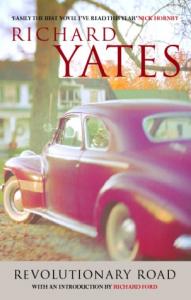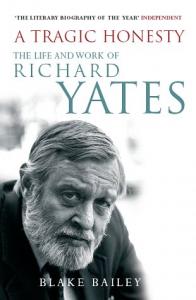Biblio File
Secret Books: Rediscovering Richard Yates
 One day last year, as I was walking home from work, so wrapped up in my own furiously careening thoughts that I wasn’t paying much attention to anything but the general direction my feet were taking me, I found myself momentarily halted in the middle of a crowd alongside Gramercy Park. As I looked around, it dawned on me that the men in the crowd were all wearing fedoras, like 1950s Madison Avenue executives, most of the women wore long pleated skirts to the knee and some had gloves on, and at the same time I realized that all the cars parked on the street were vintage models I remembered from my childhood.
One day last year, as I was walking home from work, so wrapped up in my own furiously careening thoughts that I wasn’t paying much attention to anything but the general direction my feet were taking me, I found myself momentarily halted in the middle of a crowd alongside Gramercy Park. As I looked around, it dawned on me that the men in the crowd were all wearing fedoras, like 1950s Madison Avenue executives, most of the women wore long pleated skirts to the knee and some had gloves on, and at the same time I realized that all the cars parked on the street were vintage models I remembered from my childhood.
This prompted an eerie moment of disorientation before I realized that I had stepped into the middle of a movie shoot, in this case Revolutionary Road, based on the novel by Richard Yates. I clearly remembered the story of Frank and April Wheeler, whose lives in 1955 suburban Connecticut become inexorably and tragically unglued, but was strangely distressed to learn that a book by an author who was always sort of a secret treasure of mine was being given the big-time Hollywood treatment. Soon, I imagined, I’d be spotting people on the subway holding movie tie-in paperbacks with photos of Leonard DiCaprio and Kate Winslet on the cover.
Yes, great books are meant to be shared--but the act of reading them is inherently a private one, the emotions they engender are deeply personal, and I confess to a smug satisfaction in keeping certain books to myself. It isn’t even that Yates is so much of a secret any longer. At the time of his death in 1992 he was out of print, virtually forgotten, his name and books known only to a select and cultish group of readers and a few admiring fellow writers. Much of this neglect was due to the fact that these novels and stories are not comfortable reading. Yates knows who you are: your weaknesses and cruelties, the humiliations you receive and inflict, even the lies you tell yourself in order to get through your day. His fiction is fashioned without a hint of contrivance or fabrication, wherever absolute truthfulness will lead, no matter how painful.
 Now, sixteen years after his death, Yates is probably better known than at any time in his life. The current revival of interest was sparked by Random House’s 2000 edition of Revolutionary Road and its thoughtful introduction by Richard Ford, who praised the novel’s “complete accessibility, its luminous particularity, its deep seriousness toward us human beings, about whom it conjures shocking insights and appraisals.”
Now, sixteen years after his death, Yates is probably better known than at any time in his life. The current revival of interest was sparked by Random House’s 2000 edition of Revolutionary Road and its thoughtful introduction by Richard Ford, who praised the novel’s “complete accessibility, its luminous particularity, its deep seriousness toward us human beings, about whom it conjures shocking insights and appraisals.”
A magnificent biography appeared in 2003, which should be required reading for all creative writing students whose dreams of literary glory need to be tempered by the harsh reality of the writer’s life; particularly this writer’s life, which was largely spent in an empty room, in front of a typewriter set on a coffee table, working doggedly between bouts of alcohol abuse and increasingly harrowing episodes of mental illness (he began to believe that he had shot Kennedy).
A number of Yates’s other novels and the Collected Stories of Richard Yates are finally back in print, and all are worth multiple readings. Especially fine are Disturbing the Peace, which contains vivid scenes based on Yates’s own experiences in Bellevue, and The Easter Parade, compressing the lives of two sisters in just over 200 pages, lives which go wrong because, as Yates explains, his characters “can’t help being the people they are.” Today I’m sure Yates would be surprised to find he even has his own website. Although I’m probably betraying my own literary secret (which I hope I’ve made clear is not really such a secret), Yates’s books are now widely available, including at branch libraries, where they can be borrowed. (Only his last published novel, Young Hearts Crying, is found exclusively in the General Research Division collection, where it must be read.)
I will probably not see this movie when it is released. Nowadays I tend to avoid popular American movies, feeling about them the way, as a vegetarian, I feel about meat: it doesn’t bother me that it exists, I just don’t regard it as edible. And it is a good rule of thumb that, while a mediocre book might make a great movie, a great book almost never translates well into the other medium. No matter how much acclaim this movie receives- -or how embedded in the canon of twentieth-century literature Richard Yates becomes--I will continue to hoard his work in the small pocket of myself I reserve for secret books.
Read E-Books with SimplyE
 With your library card, it's easier than ever to choose from more than 300,000 e-books on SimplyE, The New York Public Library's free e-reader app. Gain access to digital resources for all ages, including e-books, audiobooks, databases, and more.
With your library card, it's easier than ever to choose from more than 300,000 e-books on SimplyE, The New York Public Library's free e-reader app. Gain access to digital resources for all ages, including e-books, audiobooks, databases, and more.
If you don’t have an NYPL library card, New York State residents can apply for a digital card online or through SimplyE (available on the App Store or Google Play).
Need more help? Read our guide to using SimplyE.
Comments
The Lost World of Richard Yates, Found
Submitted by Jay Datema (not verified) on August 15, 2008 - 12:44pm
Hi, Jay! I guess Yates
Submitted by Robert Armitage on August 20, 2008 - 1:47pm
Strange times for Yates
Submitted by zhiv (not verified) on August 20, 2008 - 3:44pm
I loved this book when I
Submitted by samantha (not verified) on May 27, 2009 - 9:51am
Hi, Samantha! Thanks for
Submitted by Robert Armitage on May 27, 2009 - 4:50pm
I have to say I havn't seen
Submitted by samantha (not verified) on June 1, 2009 - 6:25am
Young Hearts Crying
Submitted by Thomas Jones (not verified) on October 15, 2010 - 9:01am